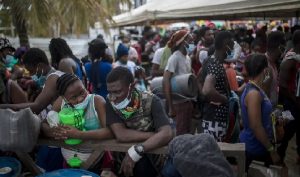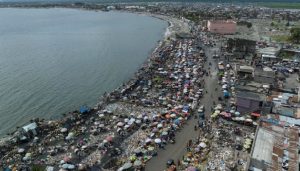21-07-2024
PORT-AU-PRINCE: The injured are receiving care provided by the IOM, and 11 of them were taken to the nearest hospital, the agency said.
Tens of thousands of people flee Haiti every year, escaping poverty, lawlessness and gang violence at home.
Rival armed groups took control of the capital, Port-au-Prince, earlier this year, forcing Prime Minister Ariel Henry to resign weeks later.
 Gregoire Goodstein, IOM’s chief of mission in Haiti, said: “This devastating event highlights the risks faced by children, women and men migrating through irregular routes – demonstrating the crucial need for safe and legal pathways for migration.
Gregoire Goodstein, IOM’s chief of mission in Haiti, said: “This devastating event highlights the risks faced by children, women and men migrating through irregular routes – demonstrating the crucial need for safe and legal pathways for migration.
“Haiti’s socio-economic situation is in agony. The extreme violence over the past months has only brought Haitians to resort to desperate measures even more.”
The lack of economic opportunities, a collapsing health system and school closures are pushing many to consider migration as the only way to survive, the IOM says.
Gang violence on average killed or injured more than one person per hour in the first three months of this year, according to UN data.
More than 86,000 migrants have been forcibly returned to Haiti by neighboring countries this year, despite the rising violence, according to the IOM.
The Caribbean nation has seen an escalation of violence following the assassination of President Jovenel Moïse three years ago.
Hundreds of Kenyan police arrived in Haiti this month as part of a mission to help Haitian police fight the gangs.
In last month, a new government has been formed in Haiti as it tries to restore order in the violence-ravaged nation.
The new cabinet completely replaces all the ministers from the government of the former Prime Minister, Ariel Henry, who was forced to step down earlier this year by gangs which control large parts of Haiti.
The announcement of the new cabinet comes two weeks after the country’s transitional government council appointed Garry Conille as interim prime minister.
 He will also take on the role of interior minister, according to the decree, published in Haiti’s official gazette.
He will also take on the role of interior minister, according to the decree, published in Haiti’s official gazette.
The formation of a cabinet in Haiti is a further sign of efforts to bring back some political stability to a nation wracked by violence and uncertainty for many months.
The transitional council appointed people to all the key cabinet positions and their ministers, a spokeswoman confirmed.
Conille’s attorney, Carlos Hercules, will be the minister for justice and public security and Haiti’s ambassador to Unesco, Dominique Dupuy, will be the foreign affairs minister.
Princeton-educated Ketleen Florestal takes over the finance ministry from Michel Patrick Boisvert, who also served as interim prime minister this year.
While some Haitians will be encouraged by these first steps towards normalcy, especially after the recent re-opening of the country’s international airport, others remain deeply worried about the scale of the task in front of the new cabinet.
Gangs still control most of the capital, Port-au-Prince, and gang leaders refuse to recognize the legitimacy of the interim council or any of the transitional leadership.
Last year an UN-backed security force, to be led by Kenya, was promised as a boost to struggling Haitian police, but it has not yet been deployed.
A planned deployment of around 1,000 Kenyan police officers to try to restore order is still yet to materialize although Kenyan President William Ruto did reiterate his support for the plan in an interview last month. (Int’l News Desk)
 Pressmediaofindia
Pressmediaofindia




